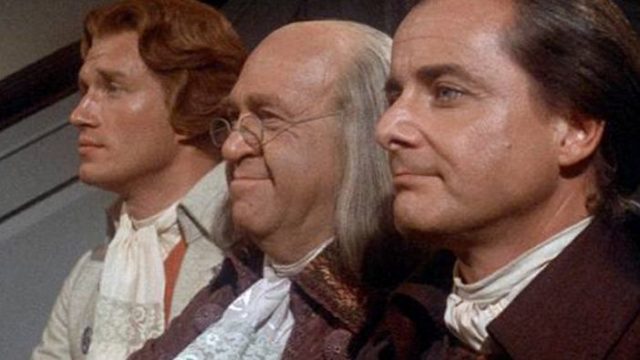In my experience, people don’t think about it, but America’s Independence Day, the Fourth of July, is about the politicians. We don’t celebrate the Revolutionary War when we celebrate 1776; honestly, it wasn’t a great year in the annals of the war; we wouldn’t have a great year in the annals of the war until after the French joined. A few decent ones, but nothing great. But in that stiflingly hot June (remember, the ratification was July 2, so most of the work was in June) in Philadelphia, a political solution was attempted. Okay, so it didn’t work, but that’s what we’re really paying tribute to—a letter that said, “Hey, we’re unhappy and here’s why.”
Strange, then, that for the most part our patriotic movies don’t celebrate that. There are two movies I can think of from the era where the Declaration was living memory that celebrate political solutions to problems, and neither of them are discussed much. One, of course, is the roughly Bicentennial musical 1776 (the musical debuted in 1969 and the movie in 1972, but what’s a few years among friends?), much loved among musical fans and historians and much forgotten by nigh well everyone else. The other is Amistad, which I’m almost alone in considering one of Spielberg’s forgotten gems. And it’s well past the Revolutionary era but does feature John Quincy Adams and so I’m counting it.
Mostly, when we celebrate our country, we celebrate its wars or its Western expansion—which is arguably a war on its own, albeit often a cold one. There’s Lincoln, set during the Civil War but about an amendment to the Constitution. Spielberg returned to the well a third time for Bridge of Spies, about Cold War negotiations. But by and large, no, we don’t talk about that end of things. I think perhaps we don’t find it as interesting—what someone I know once called “movies about people sitting in rooms talking.” But in a non-Spielberg example, 13 Days is also about people sitting in rooms and talking, and in the process saving all of human life.
I think part of it is the feeling we have that human drama isn’t sufficient for Cinema. We want, as a former professor of mine once put it, Ferris Bueller leading his troops into battle, not the tons of negotiation that led to the creation of that particular unit. We’ll put up with it if we can get a performance by Daniel Day Lewis as Lincoln, but of course we can’t always. I grant you we’re probably never going to have a need for a great cinematic Millard Fillmore, but we’ve hardly even had many cinematic Franklin Roosevelts.
I really do think we can help change the way people see US history if we just do more movies about the stuff that we don’t currently do movies about. Just show the negotiations that led to those battles, the negotiations that ended those battles. Maybe a story about the League of Nations and how it was negotiated? Or how American isolationism killed it? A film about the Marshall Plan? I can think of lots of moments to be proud of in US history that weren’t battlefields. Independence Day is a time to start thinking about them.
There’s no taxation providing your representation here at The Solute; consider paying the taxes on your tea by supporting my Patreon or Ko-fi!

